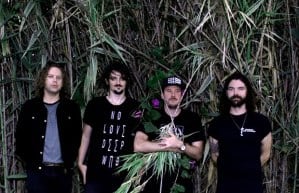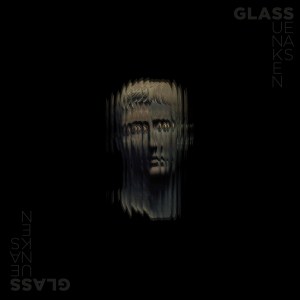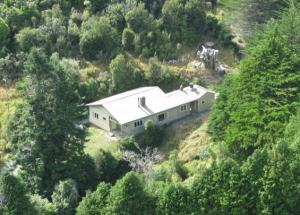Sunken Seas: Crisper & Sharp Around The Edges (Interview)
 New Zealand band Sunken Seas are about to release their latest album, Glass. The group has gone through a few changes since their previous release, 2013’s EP, Cataclysm, moving base from Wellington to Auckland and changing personnel, expanding to a four-piece. The 13th Floor’s Marty Duda spoke with band leader Ryan Harte about the making of Glass and how the band’s “hauntological rock”, has evolved over time.
New Zealand band Sunken Seas are about to release their latest album, Glass. The group has gone through a few changes since their previous release, 2013’s EP, Cataclysm, moving base from Wellington to Auckland and changing personnel, expanding to a four-piece. The 13th Floor’s Marty Duda spoke with band leader Ryan Harte about the making of Glass and how the band’s “hauntological rock”, has evolved over time.
LIsten to the interview with Sunken Seas’ Ryan Harte here:
Or, read a transcription of the interview here:
MD: The last thing you’ve done was the EP, which was in, what, 2013…Cataclysm?
RH: Yes, that’s right.
MD: And, from what I understand, there’s some changes that have occurred in the band between then and now, is that right?
RH: That is true. We’ve got a new drummer since then.
MD: He is?
RH: It’s Jordan (Puryer), he actually went to high school with the old drummer, so even though he is based up in Auckland and we used to be based in Wellington, they’ve always been tight, so that was pretty seamless. The actually inspired each other along the way drumming, you know, competitive spirit and stuff. And also Dave (Provan), our new guitarist, additional guitarist, so now we’re a four-piece, he jumped on board. And that’s been really cool because he is really good at riding the line between doing a lot of atmospheric stuff when it really needs it and heaps of space, but then he can just explode and bring down the house when it needs to happen.
MD: I assume these guys are on the (new) record as well, right?
RH: Yes, yes, so this is all four of us. This is the first body of work we’ve all…that’s why it took quite a while to get going because, obviously, going through changes is a bunch of admin stuff and just working out schedules and getting on the same level but then getting the sounds all together and figuring that out.
MD: The new album does sound more explosive than the previous stuff. Is that something that you were after or just something that kind of happened when the four of you got together?
RH: Yeah, I think that was definitely just a by-product of different people and, I don’t know, being a bit more confident…just becoming a bit more concise with songwriting too. When you’re not doing long, dragged out songs you’ve got to get your excitement from somewhere, so I guess making it more intense in parts will do it.
MD: And the fourth member that we haven’t mentioned, other than yourself, is Luke Kavanagh, right?
RH: That’s right.
 MD: And you and Luke have been working together for quite a while.
MD: And you and Luke have been working together for quite a while.
RH: Yeah so…a long time now. I forget how many years. When you said 2013 it kind of freaked me out a bit.
MD: Sorry about that! So what is it about the thing that happens between you and Luke that seems to work out so well?
RH: Everything’s pretty organic that we do. I mean, we conceive some stuff beforehand and write bits and pieces beforehand but I think what I really enjoy doing with Luke is getting into a room, having a few beers and just jamming away and then he’ll just pull the saddest, most drony-est guitar melody out of nowhere and it just tugs at your heartstrings.
MD: So how does the creative process take place? Do you jam, do you write these things out ahead of time, is it a collaborative effort? How does it work?
RH: It’s pretty democratic, which means things take quite a while. In terms of writing, most of its inspired by recorded jams…just use one of those Zoom h4n’s in the middle of the room…and got really good at positioning that and setting it up so the jams don’t sound half bad, then just kind of go through that. Edit all the fat out, do a bit of a mix then we all just have a listen to some decent bits that we can remember were quite good and songs just kind of morph out of there.
MD: So do you go back and re-record them in a proper studio or do you use the actual stuff that you’ve recorded on your Zoom?
RH: Yeah, we always re-record it. It often means that you end up with way too much content but better to be able to pick from…pick the best than have to force material together.
MD: I think I saw on your Facebook page that you describe yourselves as “hauntological rock”, is that right?
RH: Yeah, that’ll be Luke’s musings.
MD: When people ask you what kind of music you make, which inevitably must happen, how do you describe it to them?
RH: I just say ‘rock music’, I can’t be bothered. Maybe a bit of shoegaze, or something like that, if they seem like they know what shoegaze is.
MD: Do you think the sound of the band has evolved over the course of the two albums and the EP?
RH: Yes. I think with this one, for one thing, the vocals come out a lot more. I was pushing personally to try to come out from behind the…it used to be hidden behind the music. And also, the whole overall sound is a lot more drier cold…a lot more like a cold sound.
MD: A dry cold…I see.
RH: Crisper and sharp around the edges. A cushy bit around the edge so that it’s comfortable to listen to but still quite sharp. James Goldsmith, our producer on the album, he was a big part of that as well…really pushing for that particular vibe for the whole album.
MD: So how does he work with the band when you’re recording?

RH: He engineered the recording as well. We had like a week to get it done so all four of the band went to a place called Waikuku Lodge which is an hour south of Martinborough in the national park down there…just this crappy little hunting lodge, solar panels were the only power and no cellphone reception. We just set up camp there for like a week and wrote the album…finished off the songs that were already half finished and went back into civilization the weekend after that and recorded in a proper studio.
MD: Do the songs change much once you’re out playing them?
RH: Yeah, that’s one thing I’ve been really enjoying this time around. Because we’ve been spending so long getting tight and really comfortable with each other, improvising has become a lot more of a thing and also just adding stuff to songs and not being worried about missing the old recorded version of the song. You don’t want it to be stale and die on the vine. It’s so cool giving them a life of their own.
MD: Is there a tour planned once the album is released?
RH: There is indeed! We have just booked a tour for New Zealand and we’re working on an Australian one. The New Zealand tour will be starting mid-October.
MD: And I see there’s a video for the track Clear that’s available already. Is that something that you had a part in actually creating? Did you edit the video yourself as well? What was your involvement? [youtube https://www.youtube.com/watch?v=hvqMVvx4nGY]
RH: Yeah, we got a lot of ideas for different videos because we’ve all got a hand in that kind of realm of things. We just couldn’t wait any longer so we just said, ‘Let’s just do the heaviest song and perform a video for it. Let’s just get this done.’ So, to make it a bit more interesting than a standard performance video we just filled the room with smoke and had turns cycling around between the four of us…one filming, one playing with the lights, one manning the smoke machines and one obviously as the subject.
MD: I was wondering if there was a filter or some kind of video effect that gave you that. So its obviously just a fog machine, right?
RH: Yeah, yeah, a fog machine and lighting as well so it captures the depth of it. If we used a filter it would look like it was just slapped on top.
MD: Did you happen to see the band A Place To Bury Strangers earlier this week?
RH: Yeah, they’re a big inspiration and I know they do that similar thing that we did…that whole fog and the blue lit thing, right? Were they doing that?
MD: Yeah, they filled up the whole stage with fog so all you could see is pretty much silhouettes of the band.
RH: Yeah, that’s awesome. I’m looking forward to when we can do some decent budget shows.
MD: So, do you do video editing and video work outside of the band? What kind of things do you get up to when you’re not in the band?
RH: Yeah I’ve been doing heaps of live music video stuff as well like shooting live gigs and all that… music videos as well. But I’m kinda just trying to focus on music and personal video stuff at the moment. It’s a lot easier when you can just stick to one certain thing.
MD: I was wondering how you kind of work out the creative versus the commercial activities that you get up to because obviously you’ve got to make a living and if the band is making one album every few years and not playing that many shows you’re probably not living off the proceeds of the band, right?
RH: Man…APRA’s…(laughs). It’s a good question. We’ve all got our own jobs happening at the moment so it’s the only way to do it really, these days…a band like us. It’s all good, it’s all part of the struggle.
MD: So what do you hope to accomplish with this album once it comes out? World domination? A couple of gigs? What the overall strategy?
RH: I just want to be able to do a decent tour of Europe and The States as well. It’ll be great. That’s the main thing. That’s when, I think, all that hard work pays off when you’re actually able to cruise around and you don’t need to worry about whether anybody’s going to show up to the shows and stuff like that.
MD: And do you have any irons in the fire as far as The States or Europe?
RH: Everything’s just kind of ideas and conversations at the moment…pie in the sky stuff so we’ll leave that for another conversation.
- Civil War – Dir: Alex Garland (Film Review) - April 9, 2024
- Pearl Jam – Dark Matter (Monkeywrench/Republic) Album Review - April 1, 2024
- Blonde Redhead – New Zealand Tour 2024 - March 14, 2024

September 24, 2015 @ 3:42 pm
having just heard the latest New Order album”Music Complete” its reminicient of the old New order sound without it being retro nor ironic.its simply classic ! My pick ‘Plastic’ but others like the extended mix of ‘Restless’ and second track in’Singularity’ are bold and brazen loaded with hooks Hookey bass and tight drumming of old.Please review this for punters..
September 24, 2015 @ 4:03 pm
I plan to feature them on radio nz next week.